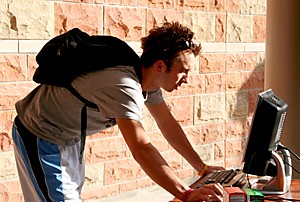Elections officials are keeping their lips sealed on how many students voted in day one of the primary elections yesterday until final numbers are tallied today and announced at 9 p.m.
Officials said the UA is a “”smaller community”” and the Associated Students of the University of Arizona elections commission isn’t trying to model city and state elections that typically release exit poll numbers before polling stations officially close, said Jordan Miller, ASUA elections commissioner.
Miller said releasing such numbers could disrupt the flow of the elections and may deter voters from coming out in support of the electoral process.
Former elections commissioner Tyler Carrell provided initial student turnout numbers to the Arizona Daily Wildcat for a brief period last semester during the Student Recreation Center vote before eventually finding out that releasing such information violated the elections code.
Many candidates vying for political office were campaigning on the UA Mall as early as 8 a.m. yesterday and continued until the polling station outside the Canyon CafǸ and Bistro at the Student Union Memorial Center closed at 5 p.m.
The voting link on the ASUA Web site remained open and can be accessed continually until 8 p.m.
Becca Rodl, assistant elections commissioner, said there was no way to keep track of how many students visited the polling station outside the SUMC, but there were crowds between noon and 2 p.m. and any time classes let out.
At slow times, however, only a handful of students at a time visited the booth, often lured by elections officials overseeing the booth. Others simply walked away when asked to vote, some saying they had voted or would vote at a later time.
Steven Gerner, a senatorial candidate, will move on to the general elections next week along with the 16 other senatorial candidates because the general election has as many as 20 candidates on the ballot.
Even though he will advance to the final round, Gerner said campaigning around campus has enabled him to meet a lot of students and listen to their opinions about what they would want to see from him next year.
Mark Adams, a senatorial candidate and music freshman, said all the senate candidates deserve to move on to the general election round because they all have good ideas for change.
Sen. Matthew Boepple, a political science sophomore who is running for re-election, disagreed, saying students may see too many names on the ballot and vote arbitrarily without considering the candidates’ platforms.
Gerner, a political science junior, said he has encouraged students to vote no matter what candidates they support because only 10 percent of the student body came out to vote in last year’s elections.
“”ASUA provides a number of services for students at their disposal,”” said Gerner, an appropriations board director. “”But only through voting can students’ voices be heard on all matters pertaining to them. This won’t happen unless students take a vested interest in student government.””
Dustin Marshall, an undeclared junior, said he voted for presidential candidate Matt Van Horn yesterday because Van Horn was the only candidate who approached him and asked what he was looking for in a president.
“”He seemed pretty genuine and listened and cared about what I had to say,”” Marshall said. “”It’s important that what we students want on campus gets done and I think (Van Horn) can be an effective leader.””
Marshall echoed other students’ suggestion that next year’s student body president should reach out and market ASUA to the masses instead of focusing its services internally.
Gerner said although he’s glad the elections code is being strictly enforced, it’s an unfortunate situation for Sens. Rhonda Tubbs and Patrick Cook, who aren’t able to campaign because of election code violations.
As elections commissioner, Miller said it’s imperative to keep election code violations confidential and to keep the elections process “”as positive as it can be.””
“”If some candidates can’t campaign, then their voice is being reduced when students need to be as informed as possible during the election process,”” Gerner said.









